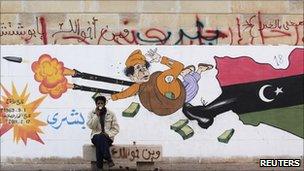William Hague says more diplomats may go to Libya
- Published

Foreign Secretary William Hague says more UK diplomats may be sent to Libya despite an SAS-escorted team being captured by anti-Gaddafi rebels.
The diplomatic team, including six SAS soldiers, was freed two days after being detained in eastern Libya.
The members left for Malta on board HMS Cumberland on Sunday night.
Mr Hague said: "We intend, in consultation with the opposition, to send a further team to strengthen our dialogue in due course."
The foreign secretary is expected to make a statement about the mission to MPs in the Commons later.
The prime minister's official spokesman has briefed journalists about the decision-making that led to the episode.
"We have been very clear that we are seeking to establish contact with opposition figures and we will continue to do so," he said.
"The operation was done in the normal way, that is, the foreign secretary taking the decision, but then discussing with the prime minister for days the necessity of getting a team in. It is our intention to send in a further team in due course to better understand the position on the ground."
The team was dropped by helicopter into eastern Libya but seized by opposition fighters and found to be carrying weapons, ammunition, maps and passports of four different countries.
In an earlier statement Mr Hague said: "The team went to Libya to initiate contacts with the opposition.
Ambassador Richard Northern's phone call was played on Libyan State TV
"They experienced difficulties, which have now been satisfactorily resolved. They have now left Libya."
Mr Hague said: "We continue to press for Gaddafi to step down and we will work with the international community to support the legitimate ambitions of the Libyan people."
The British ambassador to Libya, Richard Northern, was called in to explain to opposition forces what the group was doing in eastern Libya.
He spoke to a spokesman for former justice minister Mostafa Abdel Jalil, who is now a rebel leader, to explain the men's mission.
A telephone call between Mr Northern and Mr Jalil's spokesman was intercepted by the Gaddafi regime and excerpts were played on Libyan state television on Sunday.
In it, Mr Northern could be heard apologising for the "misunderstanding" and pleading for the men's release.
Oliver Miles, a former British ambassador to Libya, said he found the entire incident "bizarre".
"The phone lines to the country still work so there's still quite a lot of information there if you're prepared to dredge for it," he said.
"I'm glad that this particular episode seems to have ended in farce rather than tragedy."
He pointed out that Britain was not the only country to have experienced military embarrassment in Libya. The Dutch government is currently negotiating to free three of its marines who were captured along with their helicopter by pro-Gaddafi forces.
The troops had apparently been tasked with evacuating Dutch nationals from the port of Sirte.
What appeared to be video of the personnel has since been broadcast on Libyan state television.
'Johnny English'
The BBC's security correspondent Frank Gardner said the manner of the operation "seemed incompetent".
"The problem was they had communications kit with them which they didn't want compromised. But now the situation is worse - they've presumably lost the kit and their helicopter.
"There was just no need for the cloak-and-dagger approach. It was a misassessment.
"The close protection team - for that was what it was - had a lot of equipment because they didn't know what they were going into. We've been told there'll be other efforts, but the next time they'll have to use the front door.
"It all slightly reminds of that film Johnny English with Rowan Atkinson as the bumbling white-suited English diplomat. Maybe that's unfair because there'll have been other missions we'll never have heard about because they've worked. But why not do it in a more sensible way?"
Forces loyal to Col Muammar Gaddafi have fought bitter clashes with rebels in the central towns of Bin Jawad and Zawiya.
Some of Sunday's heaviest fighting was reported in Misrata, 200km (125 miles) east of Tripoli, where a local doctor told the BBC the situation became "very bad" after pro-Gaddafi forces with tanks and armoured cars went into the city centre and opened fire.
'Dodgy deals'
Libyan air force pilots have also been involved in the fighting, strafing and bombing rebel targets.
Defence Secretary Liam Fox says the idea of a "no-fly zone" would be discussed at a meeting of Nato defence ministers later this week.
Prime Minister David Cameron has also reiterated his call for Col Gaddafi to go and criticised Tony Blair's government for conducting "dodgy deals in the desert" in Libya back in 2004.
Mr Cameron told the Conservative Party spring conference: "When Margaret Thatcher was prime minister, this party stood by those who wanted to reject communism and embrace freedom.
"And today, this party stands by those reaching for that same freedom in the Arab world."
- Published7 March 2011
- Published7 March 2011